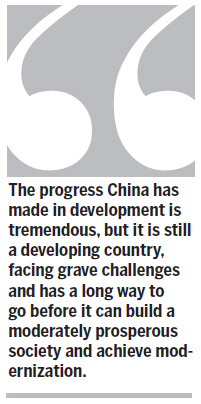View
Seeking common development
By Li Keqiang (China Daily)
Updated: 2011-01-11 07:59
 |
Large Medium Small |

Whole world will benefit from China pursuing its goal of building a xiaokang, or relatively well-off society, by 2020
There is a long history to China's path of peaceful development. The Book of Songs, a collection of Chinese poems and songs compiled more than 2,000 years ago, says: "Give relief to people who have toiled much, so they may enjoy a life of xiaokang. Promote xiaokang throughout the Central Kingdom and peace will be secured for all the four quarters." What it means is, when people work too hard, they should be given relief so that they may lead a comfortable life. Doing so benefits the people of China and people of the world.
The term xiaokang is used today to refer to a society where people can receive education, get paid through work, have access to medical services and old-age support, have a shelter, more than enough food and clothing and lead a well-off life. To build a xiaokang society in all respects is China's development goal by 2020. The Chinese people long for a happy and peaceful life and hope to enjoy harmonious relations with our neighbors. China's development calls for international cooperation over the market and resources, and more importantly requires a peaceful external environment. World peace is an important condition for China to achieve xiaokang, or moderate prosperity, and China's development in turn is conducive to world peace.
China's development benefits other countries. For the past few years, China has contributed 10-20 percent to world economic growth. Its contribution in 2009 was 50 percent. Estimates show that in 2010 China's economy grew by around 10 percent, and retail sales rose by 18.5 percent. Domestic demand contributed over 90 percent to China's growth. At the same time, expanding domestic demand has increased China's imports. It is estimated that in 2010 China's imports from other parts of the world could well top $1.39 trillion, ranking it second in the world. China needs to stabilize and expand external demand. At the same time, and more importantly, it will boost domestic demand. With its population making up one fifth of the world's total, China offers a market with enormous potential. We welcome the entry into our market of competitive goods and services from around the world, and will provide a fair and more transparent environment for foreign investors.
China is committed to working with other countries for a solution to the global challenge of energy and resources. In the past five years, China has worked hard to save energy and resources. China's energy consumption per unit of gross domestic product has dropped by about 20 percent. In the coming five years, China will vigorously develop the green economy and low-carbon technologies to continue to significantly bring down energy consumption and CO2 emission per unit of GDP. China relies on domestic supply for over 90 percent of its energy consumption, and will continue to rely on domestic supply to appropriately address the issue of energy and resources. By enhancing domestic exploitation and development, China will build new strategic reservoirs of energy and resources.
China is a constructive player in the reform of the global economic governance structure. China is a beneficiary of economic globalization. It calls for adjustment and reform of the international political and economic order in the course of development. China worked closely with the international community to address the financial crisis and promote global recovery and growth. The world will come to see that the constructive role China has played in global governance has been helpful in getting the world economy back on track toward full recovery and prosperity.
China, as a major country, does not run away from its responsibilities. In recent years, it has arranged nearly $4 billion of debt relief for 50 developing countries and it has contributed over 15,000 peacekeepers. China has actively mediated over sources of regional tension, such as the Korean Peninsula, the Iranian nuclear issue, the Arab-Israeli conflict and Darfur. It has acceded to nearly 100 multilateral international conventions, such as on the suppression of acts of nuclear terrorism. It has made solid contributions to the UN Millennium Development Goals, the IMF bailout program, the reconstruction of Afghanistan and disaster relief. It sticks to the principle of common but differentiated responsibilities and has taken concrete actions in tackling global climate change. China will remain conscientious in fulfilling international responsibilities consistent with its status as a major developing country.
Reform and opening-up are the driving forces behind our development. China will be steadfast in promoting reform. It will stick to the market orientation of reform and give greater play to the fundamental role of the market in resource allocation. At the same time, it remains devoted to greater opening-up, follows a strategy of mutual benefit with other countries and will open the country ever wider to the world.
The progress China has made in development is tremendous, but it is still a developing country, facing grave challenges and has a long way to go before it can build a moderately prosperous society and achieve modernization. China's development will not be possible without the world - and world development needs China. We are committed to working even more closely with other countries to create a bright future for all.
The author is China's vice-premier.